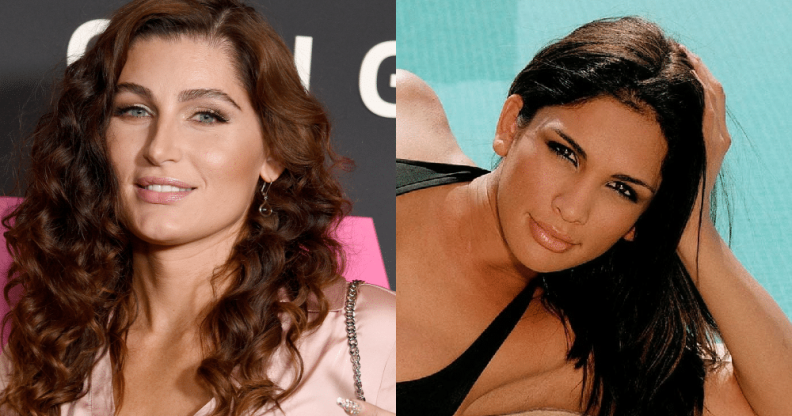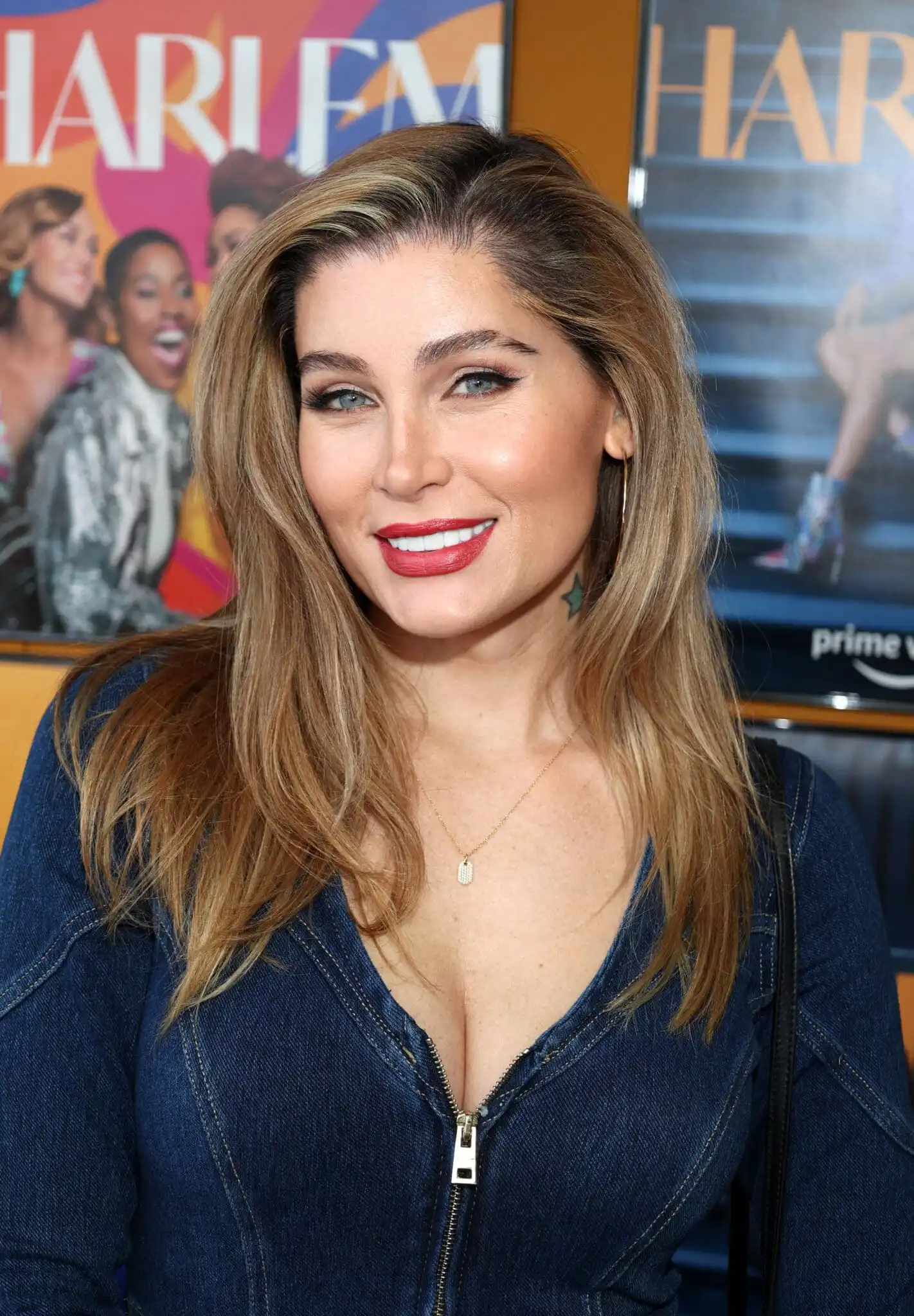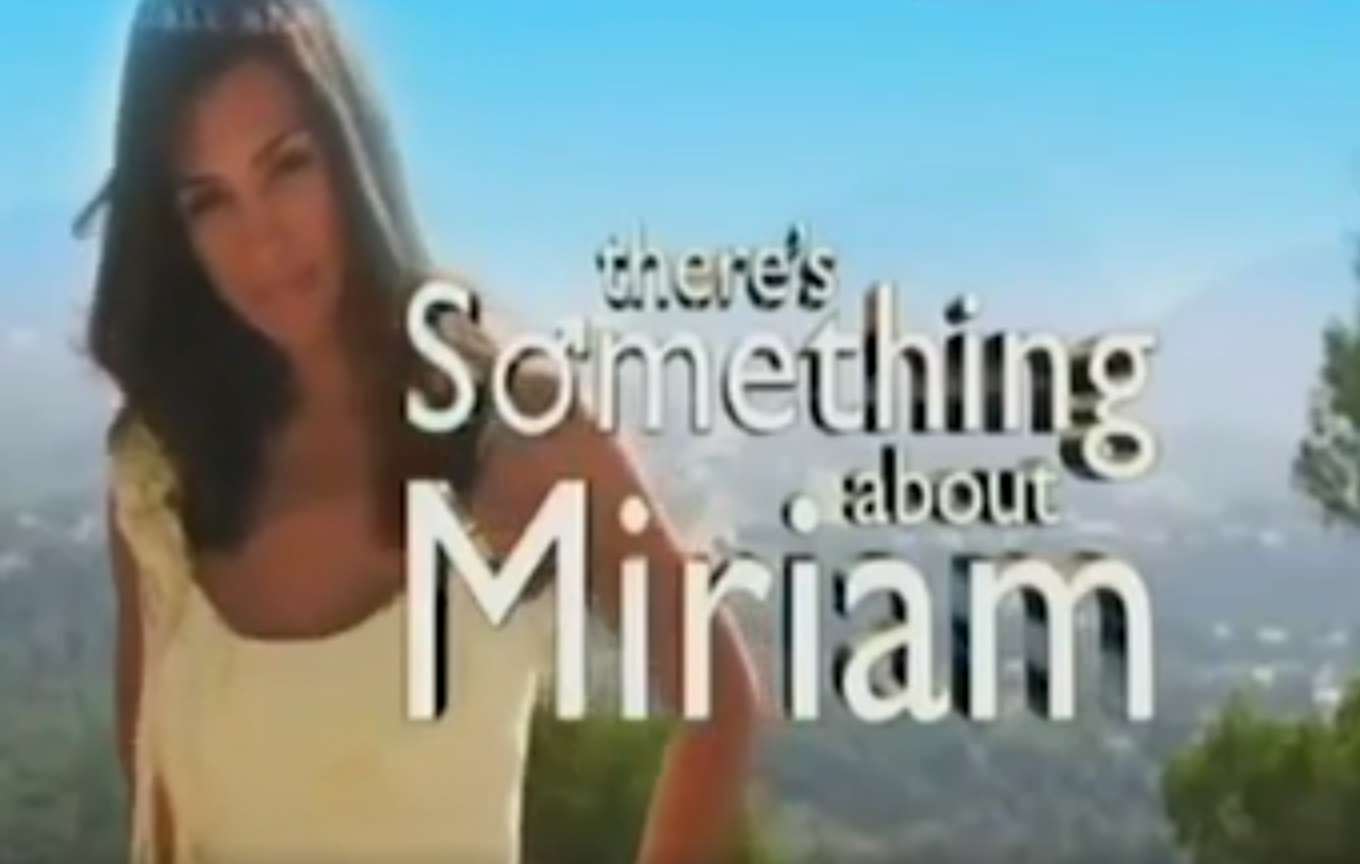Trace Lysette wants the heartbreaking story of There’s Something About Miriam to spark a reckoning

Trace Lysette and Miriam Rivera. (Getty/Sky)
Trace Lysette explores There’s Something About Miriam and the “shockwave” it sent through the trans community in her new podcast, Harsh Reality.
There’s Something About Miriam was a Love Island-esque dating show that aired back in 2004 – but producers played a cruel, transphobic joke on its star, Miriam Rivera, a Mexican model, and the six men who spent the show competing for her affection.
The twist was that, while the producers and audience knew that Miriam was trans, the men did not. Her trans status was only revealed after she chose a winner. Despite desiring Miriam, fancying her, competing for her attention, all six male contestants then sued the show saying the revelation that she was trans had “a devastating effect” on them.
For Miriam, the devastation of being outed on reality TV and the brutal media treatment that followed would impact the rest of her life. She would ultimately die by suicide in 2019. Sadly, the media today is still relentlessly publishing transmisogynistic articles about trans women.
Miriam’s treatment by the TV producers and the press, and her life subsequently, is a part of trans lore. Yet her part in our history has never before been told by trans people. Until now.
Harsh Reality: The Story of Miriam Rivera is a new six-part investigative podcast that explores Miriam’s tragic story, written by author Agnes Borinsky, produced by One From The Vaults creator Morgan Page and hosted by Transparent actress Trace Lysette.
PinkNews caught up with Trace over Zoom to find out more.
PinkNews: What do you remember from watching There’s Something About Miriam when it was on TV, in 2004?
Trace Lysette: I remember my roommate, who was also trans, she was so excited to show me this dating show and show me this other trans girl, although the cringe factor was still so obvious to both of us.
I didn’t watch the whole thing, I remember watching an episode here and there. I remember watching the finale with my roommate, because she would say: ‘Girl, you gotta come in here and see this.” We were excited, but also upset that they were trying to make a joke out of desiring a trans woman.
The world was so far behind that they just didn’t get how special we are. Unfortunately, the world is still behind. I still don’t think that we’re there. And that breaks my heart.
I hope this podcast can spark some conversations about the desirability of trans women from straight men. Why aren’t they confronting that head-on in movies, in TV? In this day and age, when I see so much gender fluidity and so much representation – which has been amazing – why are we still afraid to talk about straight, cis men desiring trans women?
Dive into the beautiful and heartbreaking world of Miriam Rivera. New episodes hosted by @tracelysette now available wherever you get your podcasts. Listen to the final episode early on Wondery+. pic.twitter.com/nJwzNXmWyV
— Wondery (@WonderyMedia) December 21, 2021
When did you first hear that a podcast was being made about Miriam and the show, and what made you want to be involved?
It was probably two months ago, when I was in San Francisco shooting Dope Queens. I heard whispers of the podcast through a friend, and brought it to my team who were like, ‘Well, are you gonna even have time to do this with Dope Queens?’ Because I was working 15 hour days, five days a week.
I said, ‘I don’t know, but I need to do this’. Because I knew Miriam. And this story is important. So, I worked on the weekend and found the time to make it happen and give them my personal memories regarding her and what I felt when I met her, and the shockwave that it sent through the trans community when the show aired.
You talk about meeting Miriam in a bathroom in the first episode. When you were making this podcast, what was it like to reflect on that time in your life – was it easy to go back into the past?
It was a sensitive time in my life to revisit. Whenever I reminisce, there’s always a risk of diving back into the trauma that I was experiencing in my 20s and being alone in New York. Going through some of the things that I went through that are pretty typical of most trans women from New York City in that time.
But I do have fond memories and Miriam was one of those fond memories. And the clubs were some of those fond memories, because those were the spaces where I actually felt I could be celebrated for who I am.

Trace Lysette in December 12, 2021 in West Hollywood, California. (Arnold Turner/Getty Images for Prime Video)
It feels like that in London still – trans women are queens in the club, but have to be so careful the rest of the time. There’s such a divide between the safety of a queer space and the danger of the street.
Absolutely. And I was a street queen through and through. There’s a lot that happened back then that is hard for me to revisit. But Miriam is definitely a bright spot.
She is a part of trans history. The podcast means that younger trans people who won’t have seen the show at the time are becoming aware of what happened. Do you think the ingredients that meant a show like that could happen in 2003 are still present in society? Have we made any progression since then?
I am a positive person and I think we have made some changes. I don’t think that a show like that would fly today, because I don’t think studio heads would want the backlash.
I don’t think that the general public’s view of us has changed that much, unfortunately. If there’s any discussion about a trans woman and a straight man I see what the public thinks – it’s very loud and clear, it’s very transphobic, I see it in Dave Chappelle‘s stand-up specials, I see it everywhere. It is everywhere.

Miriam Rivera fronted controversial TV show There’s Something About Miriam
Is there a certain audience you hope will listen to the podcast?
I really hope that the straight, cis audience will trickle in. Those are the people that really need to be reached, and understand the pain that we go through, that Miriam went through.
And I hope that it connects for them. I hope it reads as something that really happened, to a real person, and I hope that it causes them to think differently about how they think about us.
Are you surprised it took so long for Miriam’s story to be told in a way that is empathetic and accurate and not sensationalised?
No, I was not surprised that it took this long, because that’s just how Hollywood has been with us. I think there’s a bunch of stories that need to be uncovered – Miriam is just one of many trans people whose stories we need to uncover and share with the world in a way that is for for us, by us.
Instead, we get movies like The Danish Girl. Eddie [Redmayne] has admitted that was a miscast. We all knew that.
I was a consultant on The Danish Girl and remember not even getting a credit, or any kind of payment. I spent hours with one of the producers talking about my own experience, as a favour for my acting coach at the time and just working in good faith, thinking that they would give me some kind of consulting credit or fee and they didn’t. My god. I was young and naive, and I was just trying to help. I went to the screening in DC, and walked the carpet and showed up for them as a trans show pony, and looking back it feels so wrong. And hopefully this doesn’t turn into a headline me talking about this, but I do think it’s important to talk about it.
There’s countless trans people that need to have biopics. We know we’ve been left out of the history books. So it’s our job to recover all of that and cast trans people and hire trans producers and directors and be involved as much as we can.
Hopefully, Harsh Reality will spark something. It seems to be doing well, it hit number one on the podcast charts in less than 24 hours. And I think that speaks to the authenticity – we have [trans writer and artist] Morgan Page, we have a trans writer, we have me.
Harsh Reality: The Story of Miriam Rivera is made by Wondery and available now wherever you get your podcasts.

